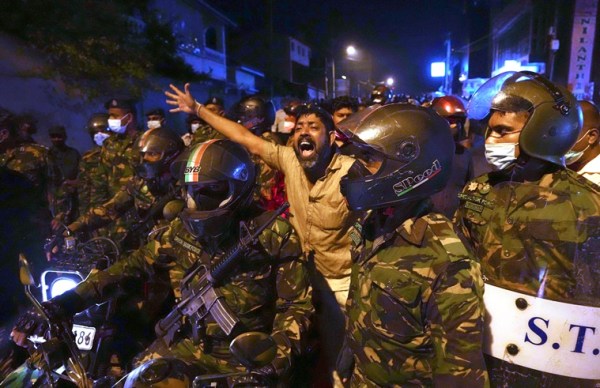
 A Sri Lankan man shouts anti government slogans during a protest outside Sri Lankan president’s private residence on the outskirts of Colombo, Sri Lanka, Thursday, March 31, 2022. (AP)
A Sri Lankan man shouts anti government slogans during a protest outside Sri Lankan president’s private residence on the outskirts of Colombo, Sri Lanka, Thursday, March 31, 2022. (AP)
Protests demanding the resignation of President Rajapaksa reportedly continued Monday morning after the 36-hour curfew was lifted. The country remains under a state of emergency, which was declared after an angry mob surrounded the private residence of the President on March 31. On Sunday, over 600 people were arrested in Sri Lanka’s Western Province for violating the curfew and trying to stage an anti-government rally. The enraged public has been blaming the Rajapaksa family for the ongoing crisis, with the two brothers at the helm as Prime Minister and President.
Opposition lawmakers, led by their leader Sajith Premadasa, had set off on a march towards the iconic Independence Square in Colombo, defying the curfew which was imposed by the government on Saturday, ahead of the planned protest for Sunday. The protest was organised by social media activists against the ongoing economic crisis and hardships heaped on people due to shortages of essentials. A total of 664 people were arrested in the Western Province on Sunday.
Meanwhile, the Sri Lankan government on Sunday lifted the ban it had imposed on social media platforms such as WhatsApp, Twitter, Facebook and Instagram after declaring a nationwide public emergency and effecting a 36-hour curfew. The services of Facebook, Twitter, YouTube, Instagram, TokTok, Snapchat, WhatsApp, Viber, Telegram, and Facebook Messenger were restored after 15 hours, according to an official. The services had been fully or partially blocked.
‘Can we eat money?’: Prices high, supplies low, despair in Lanka
Vani Susai, a 31-year-old school teacher working in Batticaloa in Sri Lanka’s eastern province, recalls the first signs of the economic crisis in the last week of January. “That Sunday morning, I ran out of gas. I called the agency to check for a cylinder and was told they could not deliver it for several days. I went in search for one, going shop to shop. I finally found a cylinder after three hours.”
Two months later, the cooking gas supply is down to once a week. “Everybody goes to this one place on Sunday and stands in a queue that starts forming at 4 am.
They give 300 tokens at one time, while the queue has over 1,000 people,” says Susai, adding that as a working woman and mother, she can’t spare the time to stand in a queue. Her husband works in the Gulf. “If I get a chance, I will leave.”
Last week, Tamil Nadu received more than a dozen people who had fled Lanka under similar economic duress. The country is facing one of its worst economic crises, battered by the Easter Sunday blasts of April 2019, two Covid waves and now the Russia-Ukraine war. The setbacks have hurt the tourism industry that is the bedrock of the Lankan economy. The island country that imports almost everything from outside has been struggling to manage supplies.